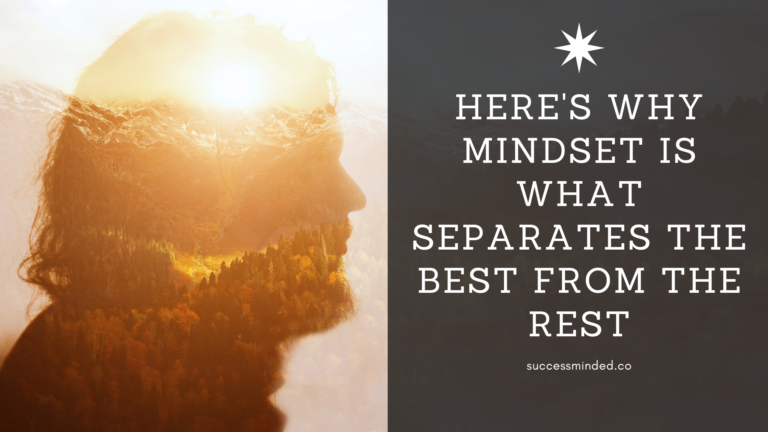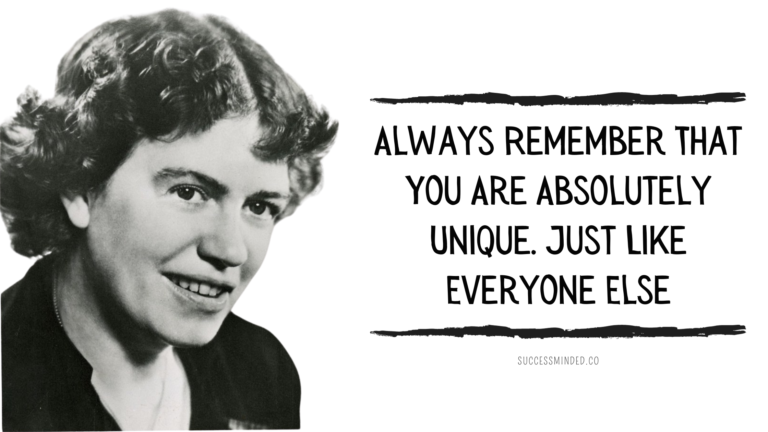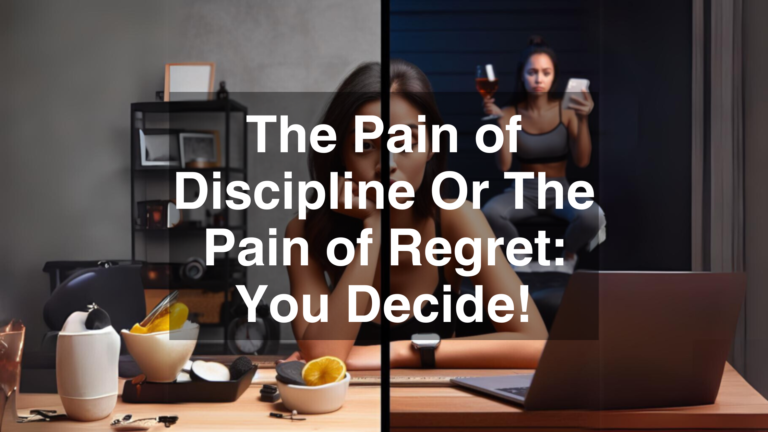“Stay hungry, stay foolish.” These four words, delivered by Steve Jobs during his 2005 Stanford Commencement Address, have echoed through the corridors of time, inspiring millions around the globe. This seemingly simple advice holds profound wisdom and has become a guiding principle for innovators, entrepreneurs, and seekers of life’s myriad mysteries. But what did Jobs really mean by urging us to stay hungry and foolish?
In this article, we explore the depths of this iconic saying, unraveling its essence and understanding how it can serve as a beacon in our quest for growth and fulfillment.
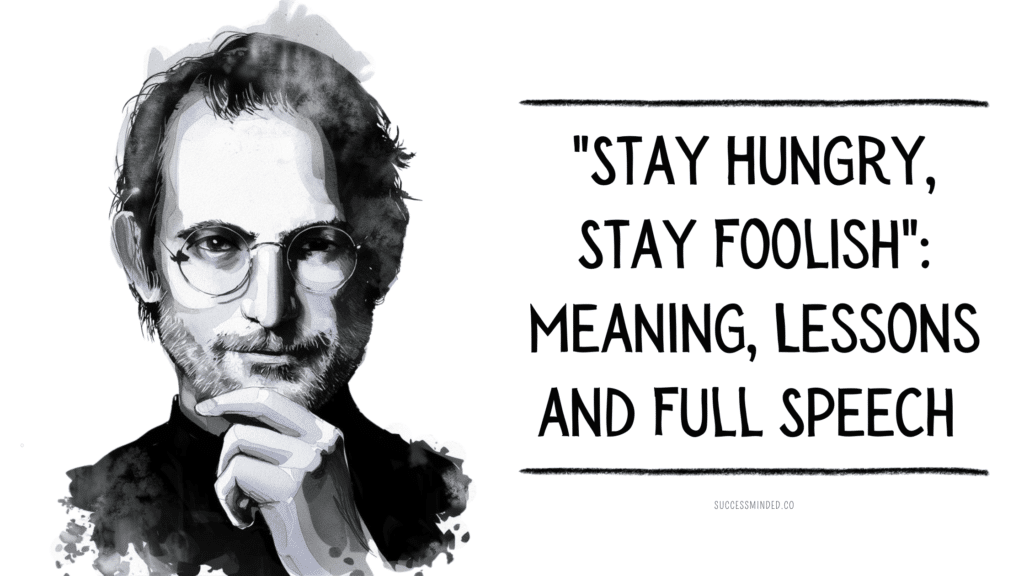
The Meaning Behind the Saying, “Stay Hungry, Stay Foolish”
At its core, “Stay hungry, stay foolish” is an invocation to never lose the drive to learn and discover. To “stay hungry” is to maintain an insatiable appetite for knowledge, growth, and personal evolution. It’s about never resting on your laurels, always seeking out new challenges, and relentlessly pushing the boundaries of what’s possible.
On the flip side, “stay foolish” champions the courage to take risks, to venture into the unknown, and to question the status quo. It’s a call to embrace failure as a stepping stone to innovation, allowing us to break free from the conventional wisdom that often limits our potential.
This mantra encourages us to maintain the curiosity of a beginner, regardless of our successes or expertise. In a world that’s constantly changing, staying hungry and foolish is about adopting a mindset of perpetual learning and openness to new experiences. It’s about being daring enough to try, fail, and try again, fostering a spirit of exploration and resilience.
The Context of Steve Jobs’ Speech
Steve Jobs delivered his now-legendary commencement speech to the graduating class at Stanford University in 2005. At this juncture in his life, Jobs had already faced significant ups and downs—co-founding Apple Inc., being ousted from the company, launching NeXT and Pixar, and then triumphantly returning to Apple. His speech, rich with personal anecdotes and life lessons, was a reflection on his journey, the hardships he endured, and the insights he gained along the way.
The “stay hungry, stay foolish” remark was part of his closing thoughts, borrowed from the final edition of “The Whole Earth Catalog,” a counterculture publication popular in the late 1960s and 1970s. In using this phrase, Jobs wasn’t just offering a piece of advice; he was imparting a philosophy for life and work. He highlighted the importance of following one’s heart and intuition, embracing the journey of life with all its uncertainties, and the value of approaching life with a beginner’s mind.
The speech has since become a cornerstone for those seeking inspiration and guidance in their personal and professional lives. Jobs’ words serve as a reminder that the path to true satisfaction and achievement isn’t paved with complacency and conformity but with the continuous pursuit of growth, learning, and the courage to challenge the conventional.
Full Transcript of the ‘Stay Hungry, Stay Foolish’ Speech
“I’m honored to be with you today for your commencement from one of the finest universities in the world. Truth be told, I never graduated from college. And this is the closest I’ve ever gotten to a college graduation.
Today, I want to tell you three stories from my life. That’s it, no big deal. Just three stories.
First story is about connecting the dots.
I dropped out of Reed College after the first six months, but then stayed around as a drop in for another 18 months or so before I really quit.
So why did I drop out? It started before I was born.
My biological mother was a young unwed graduate student, and she decided to put me up for adoption. She felt very strongly that I should be adopted by college graduates. So everything was all set for me to be adopted at birth by a lawyer and his wife.
Except that when I popped out, they decided at the last minute that they really wanted a girl.
So my parents who were on a waiting list, got a call in the middle of the night asking, “We’ve got an unexpected baby boy, do you want him?” They said, “Of course.”
My biological mother found out later that my mother had never graduated from college, and that my father had never graduated from high school. She refused to sign the final adoption papers. She only relented a few months later, when my parents promised that I would go to college.
This was the start in my life. And 17 years later, I did go to college. But I naively chose a college that was almost as expensive as Stanford.
And all of my working class parents savings were being spent on my college tuition.
After six months, I couldn’t see the value in it. I had no idea what I wanted to do with my life, and no idea how college was going to help me figure it out. And here I was spending all the money my parents had saved their entire life.
So I decided to drop out and trust that it would all work out.
Okay. It was pretty scary at the time. But looking back, it was one of the best decisions I ever made.
The minute I dropped out, I could stop taking the required classes that didn’t interest me and begin dropping in on the ones that looked far more interesting.
It wasn’t all romantic.
I didn’t have a dorm room. So I slept on the floor and friends rooms. I returned coke bottles for the five cent deposits to buy food with. And I would walk the seven miles across town every Sunday night to get one good meal a week at the Hari Krishna temple.
I loved it. And much of what I stumbled into, by following my curiosity and intuition turned out to be priceless later on.
Let me give you one example. Reed College at that time offered perhaps the best calligraphy instruction in the country. Throughout the campus, every poster, every label on every drawer was beautifully hand calligraphic because I had dropped out and didn’t have to take the normal classes. I decided to take a calligraphy class to learn how to do this.
I learned about serif and sans serif typefaces about varying the amount of space between different letter combinations about what makes great typography great. It was beautiful, historical, artistically subtle in a way that science can’t capture.
And I found it fascinating.
None of this had even a hope of any practical application in my life. But 10 years later, when we were designing the first Macintosh computer, it all came back to me. And we designed it all into the Mac.
It was the first computer with beautiful typography. If I had never dropped in on that single course in college, the Mac would have never had multiple typefaces or proportionally spaced fonts. And since Windows just copied the Mac, it’s likely that no personal computer would have them.
If I had never dropped out, I would have never dropped in on that calligraphy class and personal computers might not have the wonderful typography that they do.
Of course it was impossible to connect the dots looking forward when I was in college, but it was very, very clear looking backwards 10 years later. Again, you can’t connect the dots looking forward, you can only connect them looking backwards. So you have to trust that the dots will somehow connect in your future.
You have to trust in something, your gut, destiny, life, karma, whatever. Because believing that the dots will connect down the road will give you the confidence to follow your heart, even when it leads you off the well worn path. And that will make all the difference.
You can’t connect the dots looking forward, you can only connect them looking backwards.
My second story is about love and loss.
I was lucky, I found what I love to do early in life was and I started Apple in my parent’s garage when I was 20. We worked hard.
And in 10 years Apple had grown from just the two of us in a garage into a $2 billion company with over 4000 employees. We just released our finest creation, the Macintosh a year earlier, and I just turned 30.
And then I got fired.
How can you get fired from a company you started? Well, as Apple grew, we hired someone who I thought was very talented to run the company with me. And for the first year or so things went well. But then our visions of the future began to diverge. And eventually we had a falling out.
When we did our board of directors sided with him.
And so at 30, I was out and very publicly out what had been the focus of my entire adult life was gone. And it was devastating.
I really didn’t know what to do for a few months. I felt that I let the previous generation of entrepreneurs down that I dropped the baton as it was being passed to me.
I met with David Packard and Bob Noyce, and tried to apologize for screwing up so badly. I was a very public failure, and I even thought about running away from the valley.
But something slowly began to dawn on me. I still loved what I did. The turn of events at Apple had not changed that one bit. I’ve been rejected, but I was still in love. And so I decided to start over.
I didn’t see it then. But it turned out that getting fired from Apple was the best thing that could have ever happened to me.
The heaviness of being successful was replaced by the lightness of being a beginner again, less sure about everything. It freed me to enter one of the most creative periods of my life.
During the next five years, I started a company named NexT, another company named Pixar, and fell in love with an amazing woman who would become my wife.
Pixar went on to create the world’s first computer animated feature film Toy Story, and is now the most successful animation studio in the world. In a remarkable turn of events, Apple bought NexT and I returned to Apple. And the technology we developed at NexT is at the heart of Apple’s current renaissance, and Laureen and I have a wonderful family together.
I’m pretty sure none of this would have happened if I hadn’t been fired from Apple. It was awful tasting medicine. But I guess the patient needed it.
Sometimes life’s gonna hit you in the head with a brick. Don’t lose faith. I’m convinced that the only thing that kept me going was that I loved what I did. You’ve got to find what you love. And that is as true for work as it is for your lovers.
Your work is going to fill a large part of your life. And the only way to be truly satisfied is to do what you believe is great work. And the only way to do great work is to love what you do. If you haven’t found it yet, keep looking and don’t settle.
As with all matters of the heart, you’ll know when you find it. And like any great relationship, it just gets better and better as the years roll on. So keep looking. Don’t settle.
My third story is about death.
When I was 17, I read a quote that went something like, “If you live each day as if it was your last someday you’ll most certainly be right.” It made an impression on me.
And since then, for the past 33 years, I’ve looked in the mirror every morning and asked myself, “If today were the last day of my life, would I want to do what I am about to do today?” And whenever the answer has been no for too many days in a row, I know I need to change something.
“If today were the last day of my life, would I want to do what I am about to do today?”
Remembering that I’ll be dead soon is the most important tool I’ve ever encountered to help me make the big choices in life. Because almost everything — all external expectations, all pride, all fear of embarrassment or failure — these things just fall away in the face of death, leaving only what is truly important.
Remembering that you are going to die is the best way I know to avoid the trap of thinking you have something to lose.You are already naked, there is no reason not to follow your heart.
About a year ago, I was diagnosed with cancer. I had a scan at 7:30 in the morning, and it clearly showed a tumor on my pancreas. I didn’t even know what a pancreas was. The doctors told me [that] this was almost certainly a type of cancer that is incurable. And that I should expect to live no longer than three to six months.
My doctor advised me to go home and get my affairs in order, which is doctors code for “prepare to die”.
It means to try and tell your kids everything you thought you’d have the next 10 years to tell them in just a few months. It means to make sure everything is buttoned up. So that will be as easy as possible for your family. It means to say your goodbyes. I lived with that diagnosis all day.
Later that evening, I had a biopsy, where they stuck an endoscope down my throat through my stomach and into my intestines, put a needle into my pancreas and got a few cells from the tumor. I was sedated. But my wife who was there told me that when they viewed the cells under a microscope, the doctor started crying.
Because it turned out to be a very rare form of pancreatic cancer, that is curable with surgery. I had the surgery, and thankfully, I’m fine now. This was the closest I’ve been to facing death. And I hope it’s the closest I get for a few more decades, having lived through it.
I can now say this to you with a bit more certainty than when death was a useful but purely intellectual concept. No one wants to die. Even people who want to go to heaven, don’t want to die to get there.
And yet, death is the destination we all share. No one has ever escaped it. And that is as it should be. Because death is very likely the single best invention of life. It’s life’s change agent, it clears out the old to make way for the new.
Right now the new is you. But someday not too long from now, you will gradually become the old and be cleared away. Sorry to be so dramatic. But it’s quite true.
Your time is limited. So don’t waste it living someone else’s life. Don’t be trapped by dogma, which is living with the results of other people’s thinking. Don’t let the noise of others opinions drown out your own inner voice.
And most important, have the courage to follow your heart and intuition.
They somehow already know what you truly want to become. Everything else is secondary. When I was young, there was an amazing publication called “The Whole Earth Catalog”, which was one of the bibles of my generation. It was created by a fellow named Stuart Brand not far from here in Menlo Park. And he brought it to life with his poetic touch.
This was in the late 60s before personal computers and desktop publishing. So it was all made with typewriters, scissors and Polaroid cameras. It was sort of like Google and paperback form 35 years before Google came along. It was idealistic, overflowing with neat tools and great notions.
Stewart and his team put out several issues of the whole earth catalog. And then when it had run its course, they put out a final issue.
It was the mid 1970s and I was your age.
On the back cover of their final issue was a photograph of an early morning country road. The kind you might find yourself hitchhiking on if you were so adventurous. Beneath it, were the words,
“Stay hungry, stay foolish”
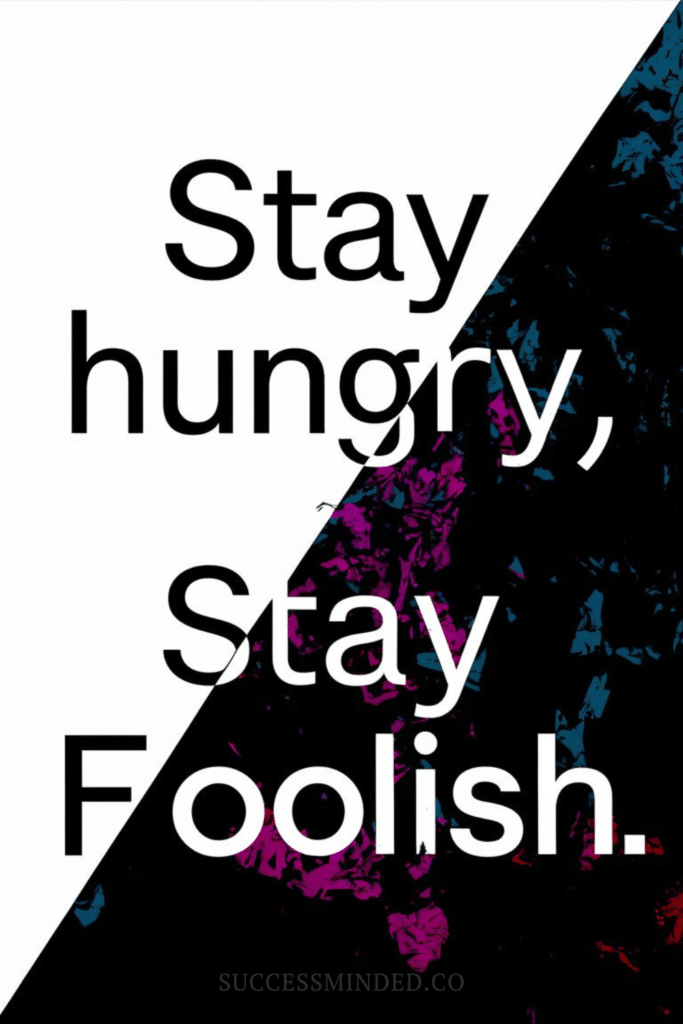
It was their farewell message as they signed off.
Stay hungry. Stay foolish.
And I’ve always wished that for myself. And now as you graduate to begin anew, I wish that for you.
Stay hungry. Stay foolish.
Thank you all very much.“
Applying ‘Stay Hungry, Stay Foolish’ in Real Life
Steve Jobs’ stories from his life, shared during his commencement speech, illustrate not just his journey but a philosophy of resilience, love for what you do, and the acceptance of life’s unpredictability. Each story carries a piece of advice that, when pieced together, forms a blueprint for living a life full of passion, discovery, and innovation.
- Connecting the Dots: Jobs’ decision to drop out of college, driven by a desire to save his parents’ life savings, led him to audit classes he was genuinely interested in, like calligraphy. This decision didn’t make sense at the time but proved invaluable later when designing the first Macintosh computer. The lesson here is about following your intuition and trusting that the dots will connect in the future. In our lives, this means embracing uncertainty and making choices that align with our deepest interests, even when they don’t seem immediately practical.
- Love and Loss: Jobs spoke about his love for what he did, which not even being fired from Apple could take away from him. This period of loss turned into one of the most creative times of his life, leading to the creation of NeXT and Pixar. This story is a powerful reminder that finding what you love doing is crucial. Stay hungry for what ignites your passion, and stay foolish enough to believe in your vision, even when faced with setbacks.
- Death: The acknowledgment of death as life’s greatest change agent underscores the urgency of living a life true to oneself, not bound by others’ expectations. Jobs’ brush with death reinforced his belief in following one’s heart and intuition. This perspective encourages us to live boldly, making the most of our limited time by pursuing our true desires and dreams, embodying the essence of staying hungry for life and foolish enough to defy the conventional.
Challenges and Misinterpretations
Adopting the “Stay hungry, stay foolish” mantra is not without its challenges. It requires a delicate balance between relentless pursuit and mindfulness of our well-being. Being “hungry” for constant growth can lead to burnout if not paired with self-care and moments of reflection. Similarly, being “foolish” in taking risks must be tempered with wisdom and a thoughtful assessment of potential consequences. The essence is not to disregard practicality but to foster a mindset that embraces continuous learning, curiosity, and the courage to step into the unknown.
Conclusion
“Stay hungry, stay foolish,” as Steve Jobs eloquently advised, is more than a catchy phrase; it’s a philosophy of life that champions curiosity, continuous learning, and the courage to follow one’s heart. It’s about embracing the journey of life with all its uncertainties, joys, and challenges. By integrating the wisdom from Jobs’ speech into our lives, we can find the inspiration to pursue our passions relentlessly, navigate through failures with resilience, and make decisions rooted in what truly matters to us. Let us carry forward this mantra as a reminder to live fully, with the daring belief that anything is possible if we remain eternally hungry for growth and foolish enough to believe in the beauty of our dreams.

